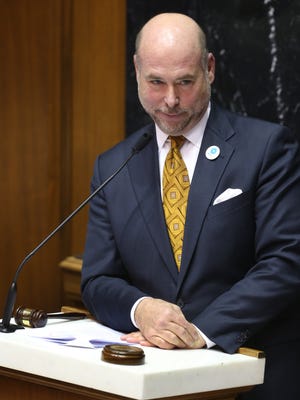How Much Do Ticket Service Reps Make At Indy 500

- The boilerplate Indiana lawmaker receives about $60,000 in public bounty.
- Reform advocates say better ethics policing is needed.
Ask Indiana lawmakers virtually possible conflicts between their private jobs and public work and you lot'll hear a common refrain: Such dilemmas are inevitable in a part-time denizen legislature.
But an Indianapolis Star review of lawmaker compensation establish that legislators receive an average of virtually $lx,000 a year. Some receive more than $seventy,000.
That'south far more than than the average Hoosier (Indiana's median household income is $48,248). Information technology's also like to what lawmakers in some states receive for working total fourth dimension.
In Indiana, lawmakers receive a relatively modest base salary of $24,140. Virtually of their compensation comes from a per diem, which is $159 a day during the legislative session. That money is intended to cover the costs of meals and hotels, but lawmakers receive it regardless of whether they actually incur those expenses. Lawmakers who live in or near Indianapolis tin simply pocket it. There is also actress pay for leadership positions.
Still, virtually lawmakers have some source of outside income.
The result can exist an ethical minefield. This yr alone:
• House Speaker Brian Bosma and House Ethics Committee Chairman Greg Steuerwald defenseless oestrus for taking legal work from the Indy Eleven professional soccer team or its owner, even as the squad sought permission from lawmakers to fund a new stadium with tax money.
• House Pedagogy Committee Chairman Bob Behning dropped plans to lobby on behalf of a pupil testing company with a $6.4 1000000 state contract afterward his efforts were reported in The Star.
• House energy committee Chairman Eric Koch authored legislation that would take stripped local governments of their ability to regulate gas and oil drilling. He dropped the measure after The Star reported on Koch's personal investments in at least 30 oil and gas companies.
Despite the potential for such conflicts, lawmakers defend the current organization.

"It'due south a production of part-time legislative bodies effectually the country," Bosma said last calendar month in defending newly appointed Majority Floor Leader Matt Lehman.
Lehman is an insurance amanuensis who until his promotion to leadership had been chairman of the Business firm Insurance Committee, where he oversaw legislation that directly affects his own manufacture. In fact, he's a member of an insurance trade group that lobbies state lawmakers.
It's not an unusual situation at the Statehouse. At to the lowest degree 60 lawmakers sit on committees that oversee legislation important to their private businesses, according to a new fiscal disclosure database The Star is launching today.
Senate President Pro Tempore David Long declined to comment for this story through a spokesman, but Bosma defended his commission appointments. Outside employment keeps lawmakers grounded in the real world and brings much-needed expertise to their public positions, he said.
Sixty one thousand dollars a year is still less than what many lawmakers brand in their individual work as attorneys or business concern owners. And many lawmakers say prohibiting outside employment would discourage qualified individuals from seeking office.
"We accept two choices," he said. "We either pay an exorbitant amount to full-fourth dimension legislators that spend every calendar week of the year legislating, or nosotros have citizen legislators step forward from all walks of life and participate in the legislative process." The only other choice, Bosma said, is a total-time legislature — something Hoosiers are unlikely to back up.
Just one could argue that Indiana already pays total-time wages.
The National Quango of Country Legislatures considers Indiana's Full general Associates a hybrid system — one in which lawmakers typically spend an boilerplate of at to the lowest degree 27 hours a week on legislative issues.
The average compensation in those states is $43,429, including base salary and per diem. Hoosier lawmakers make far more — an average of $58,766 last twelvemonth, when lawmakers met for but two½ months. And that doesn't include the lavish gifts lawmakers receive from lobbyists, such every bit expensive meals and tickets to sporting events such as Colts games and the Indianapolis 500.
Even some full-time legislatures pay lawmakers at rates similar to Indiana'southward. In Ohio, for instance, where the legislature is considered total time, rank-and-file lawmakers earn a base bacon of near $sixty,500 a yr and receive no per diem.
"Indiana's compensation, when you add the salary and per diem, is very generous when you lot consider information technology's part time," said Julia Vaughn, policy director for Mutual Cause Indiana, a government accountability grouping. "Virtually Hoosiers would love to get a part-time gig with the pay and benefits of a legislator."
In Indiana, lawmakers spend 2½ to iv months of the year in session, depending on whether they are crafting a new two-year state upkeep. They usually encounter 4 days a calendar week while in session, get-go in January.
But lawmakers say the job is actually much more than demanding. A lot of piece of work occurs exterior public meetings, and many legislators serve on acting committees that meet a few times between sessions to study specific topics.
"I've always felt like I have two full-time jobs. In many means, you lot're always on the clock," said House Minority Leader Scott Pelath, who is homo resources director for the Swanson Eye, a community mental health center. "I retrieve most members of the legislature live pretty moderately. I remember the ones that don't have had some success before they came to the legislature."
Lawmakers questioned whether adjusting lawmaker pay or the fourth dimension spent on the job would actually reduce conflicts.
"I don't know that that would even eliminate them. People are still going to maintain some course of income," Bosma said. "I would challenge y'all to detect a person of any substance that if they served in any position wouldn't have some conflict. Nosotros all are taxpayers. Nosotros all accept insurance. We have contact with the public education system."
Reducing pay would be a bad idea, said Sen. Doug Eckerty, chairman of the Senate Ethics Committee.
"I call up we certainly need an opportunity for folks of minor or bottom means to actually serve in the state legislature," he said. "My fright is that a reduction would kind of have the contrary outcome and just get in a game for the rich folks."
But the line betwixt lawmakers' public and individual roles can easily become blurry. Such was the case final year when then-Rep. Eric Turner, a top House Republican, secretly lobbied against a beak that would take hurt his family unit'due south nursing dwelling house construction business concern.
Stories in The Star and the Associated Press led to an ethics investigation that eventually cleared him of whatsoever technical wrongdoing. Bosma afterward stripped him of his leadership role, and Turner resigned.
The scandal led the legislature to laissez passer new ideals rules earlier this year. They crave members to disclose more data about their personal fiscal interests.
"The key is transparency. The primal is disclosure," Bosma said. "And the central is to not publicly or privately advocate for something that has a straight unique personal impact on you or your business concern. That'due south where Rep. Turner brutal into the greyness area of the rules — privately advocating for something that resulted in a meaning and unique benefit to him, which is why I took the activity I did."
But is disclosure enough?

"They are right in that this is a problem endemic to a role-time legislature," said Andy Downs, a political scientist at Indiana Academy-Purdue University Fort Wayne. "And there is a do good to having people with expertise on committees because it reduces the time it takes for lawmakers to go up to speed. How do you lot become about policing it is the question."
Correct now, Firm and Senate ideals committees composed of lawmakers handle conflict of interest complaints against their colleagues — a system long criticized past reform advocates.
"Anything that's internal to the legislature, people are naturally going to cast a suspicious eye on that," Vaughn said. "People believe independent investigation and enforcement of the rules is necessary because in that location is a natural tendency to circle the wagons and protect your ain."
Downs said an contained agency and penalties high plenty to deter bad beliefs would garner more organized religion in the procedure.
"Where is the check and the balance nether the current system? There isn't one," he said. "If nosotros were serious about this, we would need a style to brand anonymous complaints and a trunk that tin investigate what'southward going on."
Just lawmakers have steadfastly resisted such efforts.
Bosma said the Business firm ethics commission has done a practiced job, noting its bipartisan nature.
"It's Republicans and Democrats together, looking at people from (the) other party," he said.
Eckerty echoed that sentiment.
"In the Senate, nosotros accept a pretty good arrangement with ethics," he said. "Our folks are really very sensitive to potential conflicts when working on a bill or a vote."
Ultimately, lawmakers say, voters are the ones who take the concluding say over ideals.
"What nosotros need to do," Bosma said, "is elect people of high integrity that they are able to recognize and reveal when conflicts become so unique and personal that they could affect their judgment."
Call Star reporter Tony Melt at (317) 444-6081. Follow him on Twitter: @indystartony.
10 highest paid Indiana lawmakers
These lawmakers received the nearly bounty in 2014. It includes base of operations salary, per diem, leadership pay and actress pay for certain committee assignments.
• Sen. David Long, R-Fort Wayne: $lxx,488.
• Sen. Luke Kenley, R-Noblesville: $70,006.
• Sen. Jean Breaux, D-Indianapolis: $69,146.
• Rep. Scott Pelath, D-Michigan Urban center: $67,665.
• Sen. Jim Arnold, D-LaPorte: $66,626.
• Rep. Tim Brown, R-Crawfordsville: $66,462.
• Rep. Brian Bosma, R-Indianapolis: $65,724.
• Sen. Tim Lanane, D-Anderson: $65,439.
• Sen. Brandt Hershman, R-Buck Creek: $65,395.
• Sen. Ron Alting, R-Lafayette: $65,152.
Source: Accountant of State
IndyStar: Indiana Full general Assembly public pay / individual interests database
Ethical dilemma? House Speaker Brian Bosma has ties to Indy Eleven
House Didactics Chair Robert Behning backs off lobbying program
Amid ideals concerns, House free energy chairman drops pecker
Expert: Mental health of man accused in PV murders diminishing
Adept: Mental wellness of man accused in PV murders diminishing
How Much Do Ticket Service Reps Make At Indy 500,
Source: https://www.indystar.com/story/news/politics/2015/12/06/part-time-lawmakers-full-time-pay/75863738/
Posted by: goodwinbutenway.blogspot.com


0 Response to "How Much Do Ticket Service Reps Make At Indy 500"
Post a Comment